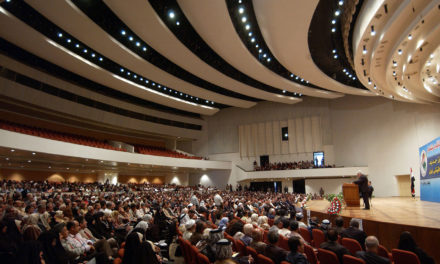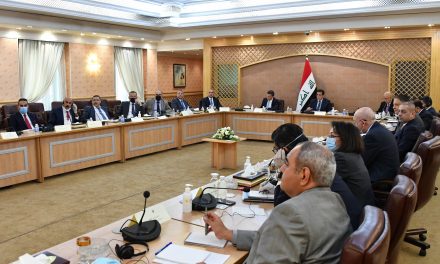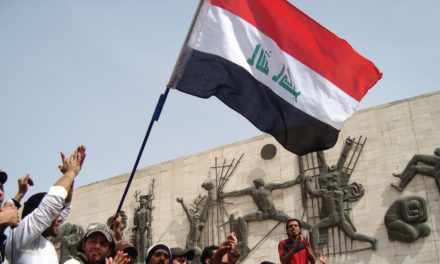Iraqi Security Forces with the support of the international coalition and cooperation with the Peshmerga forces of the Kurdistan Regional Government (KRG) have nearly defeated the terrorist group Daesh after nearly four long years of war. The liberation of Mosul has breathed new life into Iraqi unity. So how did the federal government in Baghdad and the KRG reach such a level of division only a couple of months later? To add greater confusion to the question, Prime Minister Haider Al-Abadi and de-facto President of the KRG, Masoud Barzani seemed to have mended many fences between their governments through military cooperation and politically via their dependence one another to survive rivals both in Baghdad and in the Kurdistan region.
The answer begins with the fact the war is coming to an end and the latest reason for Barzani remaining in power is nearing an end. After his controversial two year extension expired in 2015, he expressed the need for him to remain as president for stability during wartime. With Daesh on the brink of defeat, Barzani’s political rivals questioned his legitimacy again. The best way to get the Kurdish people on his side instead of his rivals was to play on their emotions of Kurdish independence, an aspiration the Kurdish people voted overwhelmingly in favour for back in a referendum in 2005.
Putting himself forward as the man who will grant the Kurdish people the independence they have longed for would allow Barzani to hide the fact that his presidency ended two years ago under the rug. It would also give him and his party a welcome distraction from an economy that is in crisis and boiling tensions with opposition parties. Therefore, Barzani announced there would be another non-binding referendum on September 25, 2017 but unlike 2005, this one will have the approval of the KRG presidency (despite its expired mandate) and the KRG parliament (despite the Speaker being barred from entering the Kurdish capital, Erbil). Although the referendum is non-binding, the promises that were coming from Barzani with this referendum gave it tremendous momentum. So much so that it took his political rivals in Sulaymaniyah by surprise.
The federal government and the international community early on voiced many concerns with holding a referendum. Whether it was Baghdad stating it was unconstitutional or the coalition claiming it would distract from the war effort, Barzani did not back down. Barzani remained adamant on holding the referendum despite both crucial international and local support at stake. The reason being was that the referendum gained so much momentum, it was out of Barzani’s hands to delay or scrap the vote altogether. As a result, his rivals Gorran and PUK gave in and supported the referendum and encouraged their base to vote yes.
Barzani and all the Kurdish leadership will now play this out as a united Kurdish victory only possible through the sacrifice of the Peshmerga throughout the years, when in reality this is a loss for them. Whether Barzani and his associates foresaw the regional backlash and international reluctance to support this endeavour is not truly relevant. Either way, it has been immense. From stern condemnations from European powers and the United States, to threats of invasion from Ankara and a military build-up of Iranian forces at the border. Internally Barzani forced all his political allies in Baghdad against him as well. Abadi has no choice but to respond to the Iraqi citizens’ cry for accountability for those that attempted to divide their country. While Barzani is now calling for calm and negotiations with Baghdad, that is only because he now knows the consequences of his actions. However, he cannot expect Abadi to take the hit for his mistake.
As for Abadi, this referendum has been a migraine but could also be a blessing in disguise. With regional and global powers standing reluctantly behind him against their Kurdish “partners” on this issue and with a livid parliament in Baghdad demanding action, he might be as close as he will ever be to having carte blanche in dealing with Erbil. This might be his only opportunity of effectively dealing a blow to post-2014 Kurdish expansionism and with next year’s elections looming on the horizon, he might seize this opportunity with both hands.
Ultimately it will be former Prime Minister, Nouri Al-Maliki that will benefit from the rift between Abadi and Barzani, a political rival to both. Abadi may be able to recover from the political hit of the referendum happening under his watch between now and until the election in 2018. But even if he does, the damage is already done for the possibility of Abadi and Barzani coming together again in 2018 to form a coalition that gives Abadi a second term in office. While this is a hit for Barzani, he will most likely use the newly created hostilities between Baghdad and the KRG as another reason to remain de-facto president of the KRG until they get through these turbulent times.

Hamzeh Hadad
Hamzeh Hadad is an Iraqi writer and commentator. He is currently a Master of Arts candidate at the Norman Paterson School of International Affairs.










